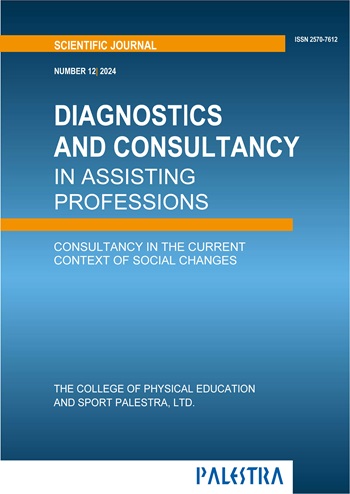The importance of the quality of social interactions between teachers and pupils in building a safe school environment - an analysis of teacher evaluation from the pupil's perspective
DOI:
https://doi.org/10.58743/dap2024no12.344Klíčová slova:
social interaction, pupils, problem behaviour, teachers, safe school climateAbstrakt
The text presents a case study. The case study is used from the author's practice. The social interaction assessment was conducted as part of a project working with a particular classroom where there is an extremely high number of children with behavioural difficulties.
There is a lot of noise, pupils find it difficult to follow school and class rules and most teachers do not like to teach there. As part of a comprehensive programme of work with this class, aimed at building a safe school environment, an evaluation of the teachers from the pupils' perspective was carried out. On the basis of the evaluation, a follow-up analysis of the typical manifestations of a "favourite teacher" and an "unpopular teacher" (according to the pupils' subjective evaluation) was carried out. This analysis pinpointed the source of problematic behaviour of pupils and served as a basis for suggesting changes to improve the situation and build a safe classroom climate.
Reference
Broadfoot, P. (1996). Education assessment and society. A sociological analysis. Buckingham, England: Open University Press.
Čapek, R. (2010). Třídní klima a školní klima. Praha: Grada
Ezeanwu, M. C., & Anyachebelu, F. E. (2020). Fostering Teacher-Pupil Relationship for Effective Learning in Public Primary Schools in Orumba North Local Government Area of Anambra State. Journal of Early Childhood and Primary Education, 2(2), 77-85. https://journals.unizik.edu.ng/index.php/jecape/article/view/462
Fischer, J., Vltavská, K., Brázdilová, M., Lipovská, H., Mazouch, P., Ptáčková, V., & Šimková, M. (2016). Eurostudent V: Vybrané výsledky šetření v České republice. Praha: MŠMT. Retrieved December, 5, 2022, from https://www.msmt.cz/uploads/odbor_30/TF/Analyticke_materialy/Eurostudent/E_VI_zaverecna_zprava.pdf
Hrabal, V., & Pavelková, I. (2010). Jaký jsem učitel? Praha: Portál.
Karaman, P. (2021) The impact of self-assessment on academic performance. A meta-analysis study. International Journal of Research in Education and Science 7(4), 1151-1166. https://doi.org/10.46328/ijres.2344
Laufková, V. (2017). Formativní hodnocení v zahraničí a v České republice.
e-Pedagogium,17(1), 89-99.https://e-pedagogium.upol.cz/artkey/epd-201701-0008_formativni-hodnoceni-v-zahranici-a-v-ceske-republice.php
León, S. P., Augusto-Landa, J. M., & García-Martínez, I. (2021). Moderating Factors in University Students’ Self-Evaluation for Sustainability. Sustainability, 13(8), 4199. https://doi.org/10.3390/su13084199
McNall, L. A., & Michel, J. S. (2016). The relationship between student core self-evaluations, support for school, and the work–school interface. Community, Work & Family, 20(3), 253–272. https://doi.org/10.1080/13668803.2016.1249827
Meskauskiene, A. (2015). Teacher-Pupil Interaction: Factors Strengthening and Impairing Adolescent's Self-esteem. Procedia-social and behavioral sciences, 197, 845-850. https://doi.org/10.1016/j.sbspro.2015.07.208
Novotová, J., & Nišponská, M. (2017). Sebehodnocení a hodnocení profesních kompetencí studentů učitelství na souvislých pedagogických praxích. Časopis Lifelong learning, 7 (1), 54-73. https://lifelonglearning.mendelu.cz/media/pdf/LLL_20170701054.pdf
Panadero, E., Jonsson, A., & Botella, J. (2017). Effects of self-assessment on self-regulated learning and self-efficacy: Four meta-analyses. Educational Research Review, 22, 74-98. https://doi.org/10.1016/j.edurev.2017.08.004
Ryberg, R., et al (2020). Measuring school climate: Validating the education department school climate survey in a sample of urban middle and high school students. AERA Open, 6(3). https://doi.org/10.1177/2332858420948024
Santiago, R. T., Garbacz, S. A., Beattie, T., & Moore, C. L. (2016). Parent‐teacher relationships in elementary school: An examination of parent‐teacher trust. Psychology in the Schools, 53(10), 1003-1017. https://doi.org/10.1002/pits.21971
Suryaningrat, R. D., Mangunsong, F. M., & Riantoputra, C. D. (2020). Teachers' aggressive behaviors: what is considered acceptable and why? Heliyon, 6(10), Article e05082.
https://doi.org/10.1016/j.heliyon.2020.e05082
Švamberk Šauerová, M. (2016). Hyperaktivita nebo hypoaktivita – výchovný problém? Bratislava: Wolters Kluwer.
Švamberk Šauerová, M. (2022). Co-teaching and other pedagogical approaches to the prevention of burnout syndrom of beginning teachers. Pp 53 – 67. In: PITUŁA, Beata a Mirosław KOWALSKI (eds.). Co-Teaching – Everyday Life or Terra Incognita of Contemporary Education? V&R unipress.
Švamberk Šauerová, M. (2019). Stres a jeho vliv na výkon ve škole. Manažment školy v praxi. https://www.direktor.sk/sk/casopis/manazment-skoly-v-praxi/stres-a-jeho-vliv-na-vykon-ve-skole.m-643.html
Švamberk Šauerová, M. (2022). Výchova neprůbojných a uzavřených dětí. Praha: Grada.
Tomšíková, K., Smékalová, L., & Slavík, M. (2014). Reflexe a sebereflexe v oblasti kompetencí: komparativní pohled vysokoškolských učitelů a jejich studentů. Lifelong Learning, 4(3), 42-57. https://lifelonglearning.mendelu.cz/media/pdf/LLL_20140403042.pdf
Troop‐Gordon, W., & Kopp, J. (2011). Teacher–child relationship quality and children's peer victimization and aggressive behavior in late childhood. Social Development, 20(3), 536-561. https://doi.org/10.1111/j.1467-9507.2011.00604.x
Urban, K., & Urban, M. (2018). Influence of fluid intelligence on accuracy of metacognitive monitoring in preschool children fades with calibration feedback. Studia Psychologica, 60(2), 123–136. https://doi.org/10.21909/sp.2018.02.757
Vasileiadou, D., & Karadimitriou, K. (2021). Examining the impact of self-assessment with the use of rubrics on primary school students’ performance. International Journal of Educational Research Open, 2021, 2. https://doi.org/10.1016/j.ijedro.2021.100031
WHO. (2022). Looking after our mental health. https://www.who.int/campaigns/connecting-the-world-to-combat-coronavirus/healthyathome/healthyathome---mental-health?gclid=Cj0KCQiA5NSdBhDfARIsALzs2EDPucKL8tCrmYfQoTQf0uuWDIBEhkjC4PeGpX8OvrKatP7CMoEd-McaAvoaEALw_wcB
Winding, T.N., Aust, B. & Andersen, L.P.S. The association between pupils´ aggressive behaviour and burnout among Danish school teachers - the role of stress and social support at work. BMC Public Health 22, 316 (2022). https://doi.org/10.1186/s12889-022-12606-1
Zimmerman, B. J., Moylan, A., Hudesman, J., White, N., & Flugman, B. (2011). Enhancing self-reflection and mathematics achievement of at-risk urban technical college students. Psychological Test and Assessment Modeling, 53(1), 141–160. https://psycnet.apa.org/record/2011-13343-007
Stahování
Publikováno
Jak citovat
Číslo
Sekce
Licence
Copyright (c) 2024 Markéta Švamber Šauerová

Tato práce je licencována pod Mezinárodní licencí Creative Commons Attribution 4.0 .
Autoři, kteří publikují v tomto časopise, souhlasí s následujícími body:- Autoři si ponechávají copyright a garantují časopisu právo prvního publikování, přitom je práce zároveň licencována pod Creative Commons Attribution licencí, která umožňuje ostatním sdílet tuto práci s tím, že přiznají jejího autora a první publikování v tomto časopisu.
- Autoři mohou vstupovat do dalších samostatných smluvních dohod pro neexkluzivní šíření práce ve verzi, ve které byla publikována v časopise (například publikovat ji v knize), avšak s tím, že přiznají její první publikování v tomto časopisu.
- Autorům je dovoleno a doporučováno, aby zpřístupnili svou práci online (například na svých webových stránkách) před a v průběhu redakčního řízení jejich příspěvku, protože takový postup může vést k produktivním výměnám názorů a také dřívější a vyšší citovanosti publikované práce (Viz Efekt otevřeného přístupu).


